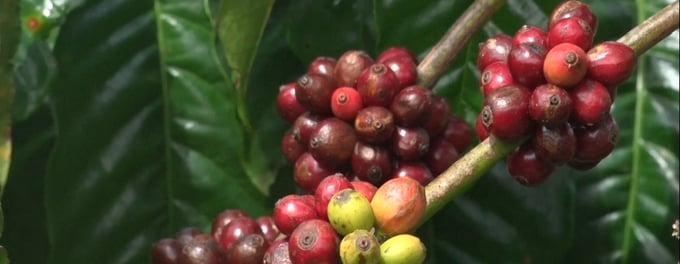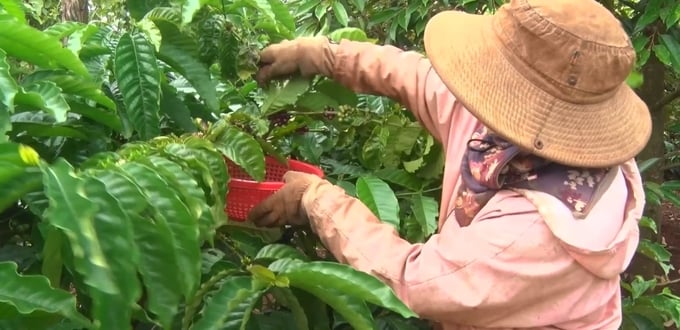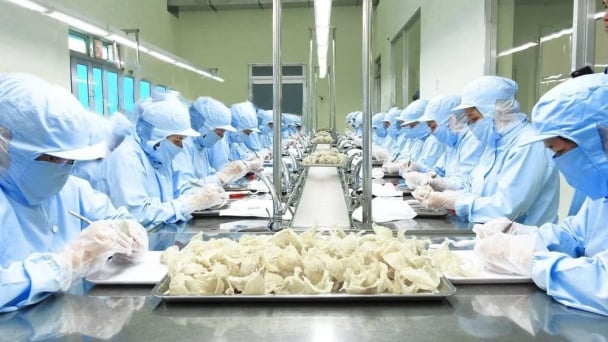May 17, 2025 | 02:38 GMT +7
May 17, 2025 | 02:38 GMT +7
Hotline: 0913.378.918
May 17, 2025 | 02:38 GMT +7
Hotline: 0913.378.918
The 2023–2024 coffee crop year is a successful year for both farmers and Vietnam's coffee industry and is about to end. The new crop year of 2024–2025 will start in October this year.
Faced with both domestic and world coffee prices in the 2023–2024 crop year rising to record highs, unprecedented in history, the problems currently concerned are how the world coffee market will evolve and how Vietnam's coffee exports will be in the new crop year of 2024–2025. To clarify the above questions, Vietnam Agriculture Newspaper reached out to two experts in the coffee industry: Mr. Nguyen Quang Binh, coffee market analyst, and Mr. Do Ha Nam, Vice Chairman of the Vietnam Coffee - Cocoa Association.

The new coffee crop year of 2024–2025 will start in October this year. Photo: VAN.
Dear Mr. Nguyen Quang Binh, as a coffee market analyst, what is your opinion on the world coffee market in the new crop year of 2024–2025?
World coffee developments will still be affected by many factors: geopolitics, coffee consumption markets, and financial situation.
Firstly, current circulation and distribution difficulties still need to be resolved. Although the U.S. Department of Agriculture (USDA) said that world production exceeds consumption by 5 million bags, the distribution stage has insurmountable bottlenecks, for example in the case of the Red Sea region, where trade flows from East to West.
Secondly, it is not afraid of a decrease in consumption but afraid of the consumption market creating fluctuations, sometimes increasing very strongly but sometimes decreasing very deeply. This affects business psychology, the sustainability of the export industry, and the selling rhythm of farmers.
Thirdly, regarding economic and financial conditions, central banks in many countries are currently considering lowering interest rates. Even from now until the end of 2025, it is predicted that the U.S. Federal Reserve can reduce interest rates by 2.25% compared to the current rate of 5.25–5.5%. Thus, conditions for credit, capital, and interest rates are being opened right in Vietnam.
However, the difficulty for the coffee industry is actually the distribution and circulation stage, especially sea transport. At the same time, it must be said that although the London futures exchange increased and saw benefits, it was actually not beneficial for exports because it had sudden jumps and sometimes fell deeply, making the business psychology of the business community unstable.

Mr. Do Ha Nam, Vice Chairman of the Vietnam Coffee - Cocoa Association. Photo: VAN.
Dear Mr. Do Ha Nam, with the developments in the world market as Mr. Binh just analyzed as well as the domestic production situation, how do you evaluate the ability to export Vietnamese coffee in the 2024–2025 crop year?
Looking back to 2023, if we have better financial resources and a quantity of goods that are not sold hastily at harvest time, Vietnam's profits this year will be much larger. Because it is known that at the beginning of the crop, the price of coffee was only VND 60,000-70,000/kg, and today, we even cannot buy at a price of over VND 120,000/kg.
That situation happens partly because farmers need money during the crop, so they have to sell goods. Meanwhile, businesses' lines of credit from banks are limited, so businesses cannot hold goods to store. When prices suddenly increase, there is a huge difference in many contracts signed in advance by businesses and suppliers with producers and warehouses, as they expected low prices for many years. Supplying businesses could not promptly buy goods, even though producers had already sold a part of the goods with a deposit, because the price difference was too large and producers and warehouses did not want to deliver goods.
Those risks are very dangerous because they will lead to a loss of reputation for Vietnamese coffee businesses. In fact, this is the second year we have encountered this risk. Basically, businesses with warehouses are required to follow the trend of paying money after goods enter the warehouse, so the level of risk will obviously decrease, but businesses that do pure commerce will continue to face difficulties.

Coffee prices will remain stable and will be still beneficial for farmers. Photo: VAN.
In the coming years, if prices continue to fluctuate, risks will still appear. Fortunately, most Vietnamese businesses today basically have warehouses and pre-processing, so the level of risk has been greatly reduced. Last year was basically stable, which was favorable.
However, the transportation costs are currently very high. Although gasoline prices are falling, Vietnamese coffee trips to Europe cannot now go through the Red Sea but must go down to Africa and go back up, so the travel time has increased a lot, even the whole month while it previously took only 20 days. Costs will naturally increase, not to mention the risks of price squeezes by logistics carriers. That also affects the price market.
When prices are too high, inventories at factories are very low. And when manufacturers' inventories are not enough, they are forced to buy at high prices to ensure their production stability, thereby affecting the price market.
It is also difficult to predict next year in a standard way, but it is believed that prices will remain stable and will be still beneficial for farmers. The coffee industry will certainly continue to achieve peak if Vietnamese businesses have better financial resources and are based on the price market. Especially the Vietnam Coffee - Cocoa Association tries to provide good information to businesses and support businesses in information; and the Ministry of Agriculture and the Ministry of Industry and Trade coordinate in market price information, expanding markets, especially Asian and African markets.
Thank you, sir!
Translated by Thu Huyen

(VAN) Japan's efforts to lower the price of rice through the release of its stockpile may finally be making some progress, albeit at a snail's pace.

(VAN) U.S. tariffs are not only a 'shock', but also an opportunity for Vietnamese businesses to renew their mindset toward comprehensive development.

(VAN) As Bac Giang lychee enters the harvest season, Minister Do Duc Duy expects that the fruit will contribute greatly to agricultural exports due to standardized production and deep processing.

(VAN) Consumers have shown a preference for free-range eggs, but those farming systems are more vulnerable to biosecurity risks like bird flu.
/2025/05/09/5701-1-184335_301.jpg)
(VAN) Vietnam’s eel exports nearly doubled thanks to a mud-free farming model, opening up new prospects while still facing numerous barriers related to international standards.

(VAN) Minister Do Duc Duy warned that if production is not professionalized and supply chains are not transparent, the U.S. market could become a growth bottleneck.

(VAN) Delegating surveillance responsibilities to local authorities is a cost-saving and efficiency-boosting measure that removes a key bottleneck for enterprises, according to Director General Duong Tat Thang.